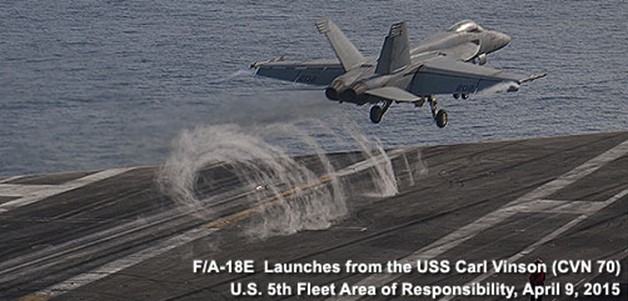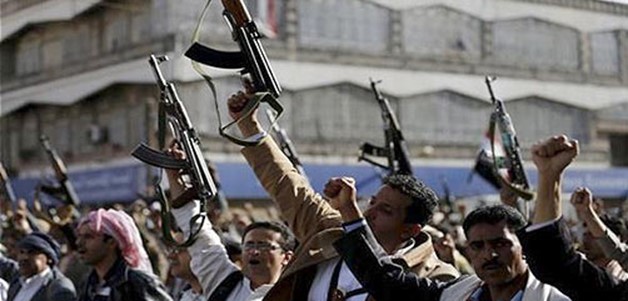| From AlertsUSA |
|||
 |
|||
|
|||
|
|||
| On April 7, 2015, AlertsUSA issued the following related Flash message to subscriber mobile devices: |
|||
|
|||
| What You Need To Know | |||
| One Tues of this week AlertsUSA subscribers were notified via SMS messages to their mobile devices regarding a stunning decision by the U.S. government to not carry out emergency evacuations of American citizens from the war-torn country. While Pentagon spokesman U.S. Army Col. Steve Warren says that United States has “assets in place” to carry out the evacuation, State Department spokeswoman Marie Harf declared there are “no plans for U.S. assets to be used” as the security situation was too precarious. “Given the situation in Yemen, it’s quite dangerous and unpredictable. Doing something like sending in military assets, even for an evacuation, could put U.S. citizen lives at greater risk.” Instead, the State Department posted two messages to the website of the now abandoned U.S. Embassy telling Americans to call the Embassy of India or the International Organization for Migration for assistance. And so there is no mistake as to who pulls the strings in such matters, while news reports all focus on the State Department and the Pentagon, any such orders begin with the National Command Authority. The chain of command runs from the President to the Secretary of Defense to the Joint Chiefs of Staff and then to the Specified Commands. In short, it is the Office of the President of the United States which ultimately makes the command decision to use military forces to execute an evacuation. AlertsUSA’s Pentagon sources say there is significant anger and frustration within the DoD over this decision by the White House, particularly in light of the fact that there are two aircraft carrier battle groups in the region as well as a big deck amphibious warship with thousands of Marines and dozens of helicopters and V22s just offshore. One of our sources indicated that this situation “carries the essence of Benghazi about it,” in reference to the failure to provide military assistance to the U.S. diplomatic mission in Benghazi, Libya when it came under attack in 2012. India’s foreign ministry reports they received a request from the U.S. for assistance in evacuating citizens. As of the time of this report’s preparation on Friday, several Americans have been assisted in leaving the country by India and Pakistan though solid numbers have been difficult to obtain. ABC’s San Francisco affiliate is reporting on a local resident who was able to get to the coast, then rode on a boat with a fisherman across the Red Sea into Africa, ultimately traveling to Amsterdam before taking a flight back to California. Other countries carrying out mass evacuations of their citizens this week with few troubles include Canada, France, Russia, China and Somalia. With hundreds of Americans left stranded, on Thursday of this week three human rights groups, including the Council on American-Islamic Relations (or CAIR), filed a lawsuit in the U.S. District Court in Washington, DC seeking the court’s relief by ordering the Department of State and Department of Defense to evacuate U.S. citizens. While it is obvious that the judicial branch of the U.S. government has no influence in this area, the move calls further attention to the matter, particularly in light of the fact that the US is, at a minimum, supporting Saudi Arabia and other Gulf states with logistics and intelligence assistance in the conflict. AL QAEDA THREAT GROWS US Defense Secretary Ashton Carter acknowledged on Wednesday that the conflict in Yemen has allowed Al Qaeda in the Arabian Peninsula, the terror organizations most active arm, to make significant gains in their threat to U.S. national security. According to Secretary Carter, IRAN DEPLOYS WARSHIPS TO YEMEN In addition to a significant U.S., Egyptian, Saudi, Pakistani and French naval presence in the region, tensions increased this week when Iran dispatched their own warships to the strategic Bab al-Mandab strait. Readers are reminded that Iran is the principle source of support and arms for the Houti rebels whom are responsible for bringing down the government in Yemen. Pentagon sources indicate a close eye is being kept on the vessels as, while small in number, there is a very real potential for the deployment of sea mines if the tensions increase. IRAN THREATENS SAUDI ARABIA On Thursday of this week, Iran’s President Hassan Rouhani indirectly threatened Saudi Arabia, stating, “You will learn, not later but soon, that you are making a mistake in Yemen, too. Iran’s Supreme Leader, Ayatollah Seyed Ali Khamenei, was far less diplomatic and warned of dire repercussions. During a public address in Tehran on Thursday, Khamenei declared that “the Saudis will definitely be struck back in this issue and their nose will be rubbed against the ground,” using a Middle Eastern colloquialism meaning they will be defeated. SECRETARY OF STATE WARNS IRAN Perhaps most outspoken this week was Secretary of State John Kerry, who warned Iran over its increased involvement in Yemen’s civil war. In an interview with PBS News Hour, Secretary Kerry stated the following: His statements highlight, yet again, the dangerous situation within which the Obama Administration finds itself. On one hand, there is Iran’s direct involvement with the Houti overthrow of Yemen which the U.S. is indirectly fighting against. On the other hand is the U.S. collaboration with Iran on fighting the Islamic State in Iraq. And on a third side, there is the laughable outcome of negotiations with Iran over their nuclear program. CONFLICTING VIEWS ON NUCLEAR ACCORD Late this week, Iran’s Supreme Leader Ayatollah Khamenei made his first public comments on the supposed “framework” the Obama administration has been hyping as the basis for a nuclear accord. In his comments, Khamenei accused the Obama administration of blatantly “lying” about most of the proposed terms, saying he is being “deceptive,” and has “devilish” intentions. (Also see this, this and this.) For those keeping track, it is important to note that this week the Theodore Roosevelt Carrier Strike Group passed South through the Suez Canal and into the Red Sea. The Carl Vinson Carrier Strike Group is currently operating in the vicinity of the Persian Gulf and the Big Deck Amphibious Assault Ship USS Iwo Jima is somewhere off the coast of Yemen and overall, tensions are high. (See regional map here.) AlertsUSA continues to monitor developments in this region, as well as its impact on the domestic terrorism threat environment and will immediately notify service subscribers of changes in the overall threat picture for U.S. citizens and interests as events warrant. |
|||
 |
|||
|
|


|
When Things Go Sideways While Traveling |
|
April 11, 2015 |
What You Need To KnowGiven the situation unfolding in Yemen and the unbelievable decision of the U.S. government to NOT provide a means of evacuating American citizens, this should be a serious wake-up call that you can no longer depend on the U.S. government to render assistance in critical, life threatening situations. As such, it is imperative that international travelers have their own safety net in place PRIOR TO LEAVING, even if you are simply heading off for vacation in the Caribbean, Mexico or Europe.
Here at AlertsUSA, when our employees travel abroad we exclusively use the services of Boston-based Global Rescue. The firm provides best-in-class medical, aeromedical evacuation, search and rescue and security services to individuals, corporations, travelers and expeditions worldwide.
In addition to medical evacuations back to the hospital of your choice in your home country, Global Rescue also provides security services under which members can be evacuated in the event of crises that threaten their personal security when traveling, such as war, civil unrest, coup d’état (ala Yemen) or natural disasters. While we have (thankfully) had no need to call upon their services in an emergency, knowing we have a reliable partner during our travel abroad provides considerable peace of mind. This is particularly true in times where the assistance of your own government is in question.
Global Rescue is partnered with Johns Hopkins Medicine so as to provide members with world-class specialists to assist it’s deployable paramedics and physicians. The company’s emergency response teams are comprised of paramedics, physicians and security personnel, many of whom are veterans of the U.S. Special Operations community.
If you, members of your family or employees travel outside of the U.S., even for simple vacations to the Caribbean, Mexico or Europe, AlertsUSA strongly urges you to consider securing their coverage.

|
Travel Security Update The U.S. Dept. of State is the authoritative federal source for information on the security situation at travel destinations worldwide. With tensions rapidly increasing in most regions, readers planning on international travel, even to such common destinations as Canada, Mexico or the Caribbean Islands, are strongly encouraged to do a little research on the security situation prior to departure. Latest USGOV Travel Alerts and Warnings
|
Start now to make sure you are staying prepared.
Via: threatjournal









 Follow
Follow
Leave a Reply